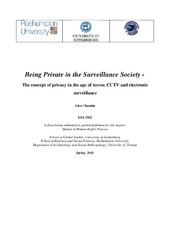Being private in the surveillance society : the concept of privacy in the age of terror, CCTV and electronic surveillance
Author
Thesslin, GlenAbstract
Abstract:
Defending the right to privacy is a growing concern in modern society as surveillance, as a
formidable weapon in the “war on terror”, becomes more intrusive with every passing year. In order
to effectively defend the right to privacy one must know what privacy actually is. Privacy does not
have one universal definition, but is a concept that has evolved though varied socio-cultural and
historical circumstances, and is constantly being re-contextualised.
This paper aims to discuss and compare various conceptions of privacy, and the right to privacy,
with a focus on challenges brought about by technological developments and surveillance. In
addition it aims to analyse the implications of surveillance on the right to privacy, with a particular
emphasis on video surveillance. In order to reach these goals the paper compares and discusses
various academic conceptualisations of privacy, and analyses the discourse surrounding two
examples of video surveillance, CCTV coverage of London and the use of covert video surveillance
against Arne Treholt, a former bureau chief of the Norwegian Ministry of Foreign Affairs.
Many varied aspects of privacy are considered, with emphasis placed onto two distinct conceptions
of privacy; an inherent-value based conception which views privacy as a goal in itself, which is
necessary for full human development, and an exchange based conception which views privacy in
terms of an exchange, where personal data is disclosed in return for societal goods and benefits.
Privacy is conceived as the control of one’s own personal data at the most basic level, while
surveillance is the process of recording private data; they are antagonistic contradictions.
Using the examples, the paper attempts to reconcile surveillance with privacy; an exchange
conception of privacy can accept derogations to the right to privacy in return for more security,
although only if based upon a fair exchange, something the video surveillance regimes in the
example likely do not provide.
The paper concludes with some policy recommendations regarding increased regulation and transparency of surveillance.
Publisher
Universitetet i TromsøUniversity of Tromsø
Metadata
Show full item recordCollections
Copyright 2011 The Author(s)
The following license file are associated with this item:


 English
English norsk
norsk
